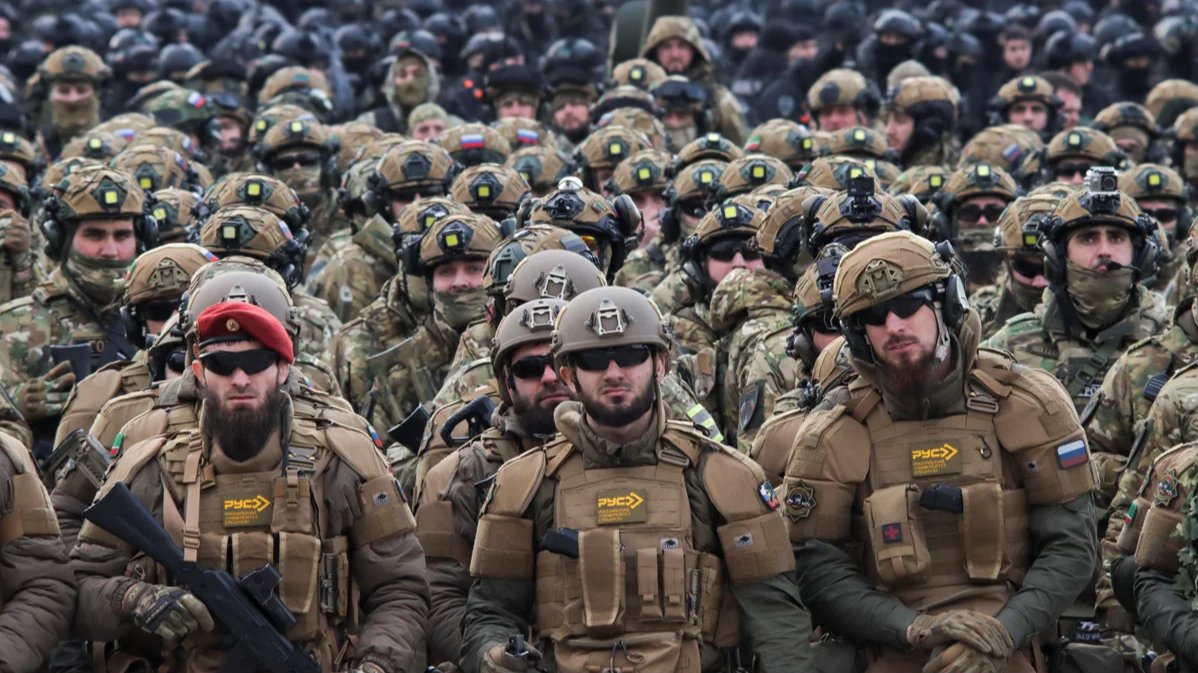During Vladimir Putin’s brief visit to Chechnya on 20 August, Ramzan Kadyrov publicly bragged that he had sent over 40,000 troops to bolster Russian forces fighting in Ukraine, including over 19,000 soldiers who had voluntarily enlisted, before alluding to an enormous military reserve he had on standby that was ready to join the war at a moment’s notice.
Shortly after Putin’s four-hour visit to the North Caucasus republic had drawn to a close, according to sources who spoke to Novaya Gazeta Europe, Chechen Interior Ministry district heads were issued with orders requiring each police station in the republic to deliver a quota of 25 “volunteers” to enlist in Kadyrov’s militia. The move suggests that rather than significant military reserves, all that Kadyrov has permanently ready to deploy is an ability to tell dazzling, barefaced lies to his benefactor, and that he will do everything in his power to avoid mobilisation in Chechnya.
How has Kadyrov managed to maintain the illusion of a mass army of “Chechen foot soldiers” ready to fight for Putin?
The two Akhmats
The Chechen Defence Ministry’s special forces battalion Akhmat-Chechnya, which reportedly fled from its fortified positions at the first sight of the Ukrainian military incursion into the Kursk region last month and somehow still managed to have at least 10 of its soldiers captured, has become a symbol of the alarming incompetence of the Russian military.
Both Ramazan Kadyrov and Igor Konashenkov, the Russian Defence Ministry’s spokesperson, mysteriously vanished from view in the aftermath of that particular failure, leaving Apti Alaudinov, the commander of the Akhmat special forces battalion, which has no connection to the Akhmat-Chechnya battalion, to become the “voice” of the Kursk frontline.
The Akhmat-Chechnya regiment, which was guarding Russia’s borders in the Kursk region at the time of the Ukrainian attack, lacks the level of organisation or sufficient training to undertake real military operations.
When the Armed Forces of Ukraine (AFU) crossed the Ukrainian border into Russia’s Kursk region on 6 August, the Akhmat Battalion led by Alaudinov was stationed in several sections of the Ukrainian frontline, but was not defending Russia’s border with Ukraine in the Kursk region or anywhere else, for that matter.
Alaudinov was forced to step into a spokesperson role mainly as online commentators frequently confused the two Akhmat battalions and attempted to blame the failures of his battalion for the success of Ukraine’s cross-border incursion. In reality, it was completely different formations that had been charged with defending the Russian border, including border guards, conscripts, militias and Kadyrov soldiers, none of which had military experience.
The original Akhmat Battalion was formed in Chechnya under Apti Alaudinov and was made up overwhelmingly of voluntary recruits who came from all over Russia to serve after signing a four-month contract with the Vladimir Putin Russian Special Forces University in Gudermes. Despite its name, the Akhmat special forces battalion is predominantly ethnic Russian in composition, and Chechens have always been a minority.
All the remaining Chechen divisions into which Ramzan Kadyrov has exclusively drafted residents of Chechnya have been created as a way to demonstrate that the Chechen authorities were not only sending Russian troops into war, but Chechens as well.
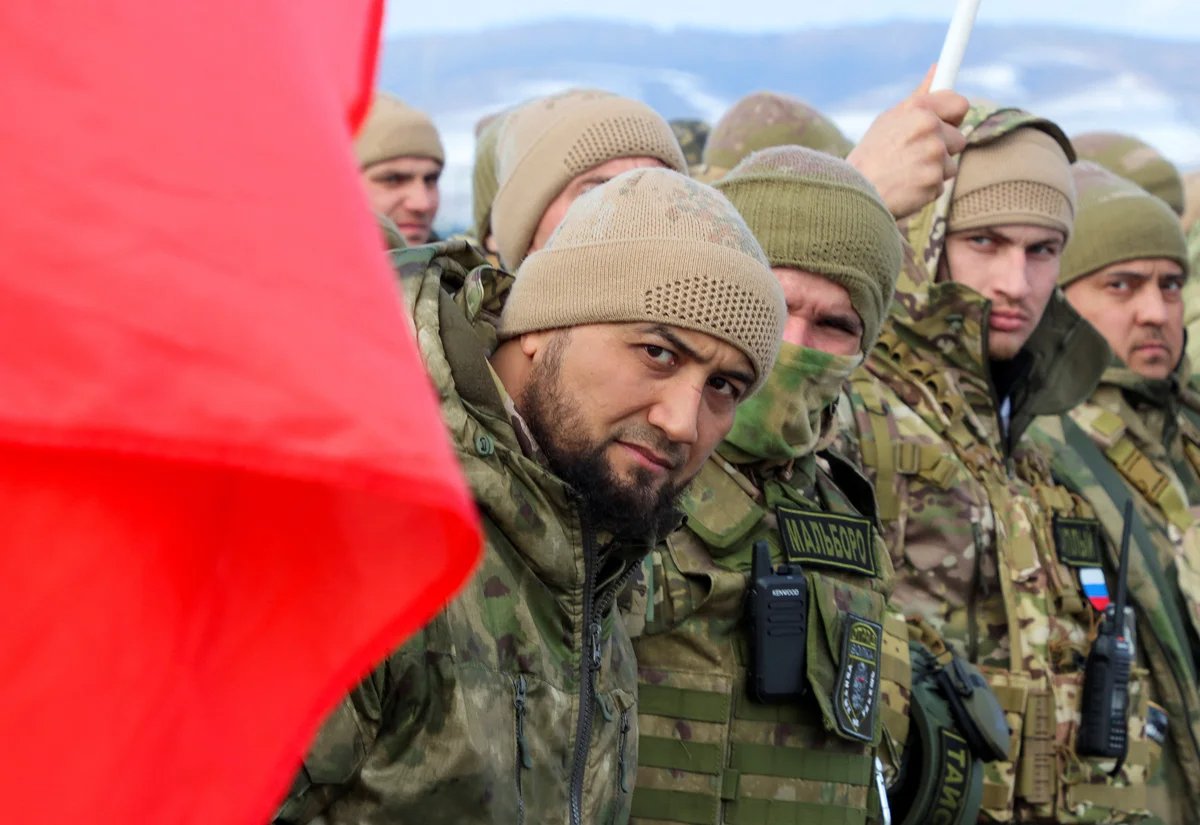
Volunteers who joined the Russian armed forces and did military training in Chechnya at Grozny airport, 17 January 2024. Photo: Chingiz Kondarov / Reuters / Scanpix / LETA
The Akhmat and Akhmat-Chechnya battalions not only differ in their ethnic composition, but also in their degree of combat readiness. The commanders of Akhmat, like those in the notorious Wagner Group, are former Russian soldiers, some of whom previously served in Wagner themselves.
The Akhmat Battalion was recently joined by fighters under the command of Ratibor, one of the Wagner Group’s best-known mercenaries. Akhmat, like Wagner itself, has its own autonomous structure with its own intelligence agency, artillery units, drone units, medical teams and other rear divisions. By contrast, the Akhmat-Chechnya regiment, which was guarding Russia’s borders in the Kursk region at the time of the Ukrainian attack, lacks this level of organisation or sufficient training to undertake real military operations.
Who’s afraid of the Chechens?
Like other Chechen divisions created by Kadyrov for PR purposes and deployed to areas thought to be relatively risk free, such as Russia’s Belgorod, Bryansk and Kursk regions, members of the Akhmat-Chechnya Battalion were not even observing basic military discipline when the surprise Ukrainian incursion on 6 August began.
This fact was shared by pro-war Russian blogger Anastasia Kashevarova during a discussion of the possible causes for the successful AFU advance into the Kursk region. “The behaviour of some of the soldiers on the border is not in keeping with the duty and tasks of a soldier,” Kashevarova said, adding that “despite serving on the national border of a country at war, they were totally relaxed, dressed in civilian clothes, not carrying weapons.”
Kashevarova added that this was the reason so many Russian prisoners of war had been captured, explaining that many were taken prisoner “not at their posts but in towns where they were taking a break from the hardships of service” and even accused some of the Kursk POWs of wearing slippers, comparing them unfavourably with the “shell-shocked, dirty and injured” soldiers fighting elsewhere in Ukraine, who she said had “clearly fought to the last”.
Indeed, most of what the generation of Chechens who grew up under Putin know about war they learned from playing computer games.
Despite their fearsome bearded appearance, the rank-and-file Akhmat-Chechnya troops had no military experience whatsoever. The prevailing myth that all Chechens are born with a gun in their hands may still be widely accepted as fact by many in Russia, but the generation that fought the Russian military in the name of Chechen independence is long gone — most of them were either killed in the war or subsequently chose to emigrate following Moscow’s comprehensive crushing of any independence pipedreams.
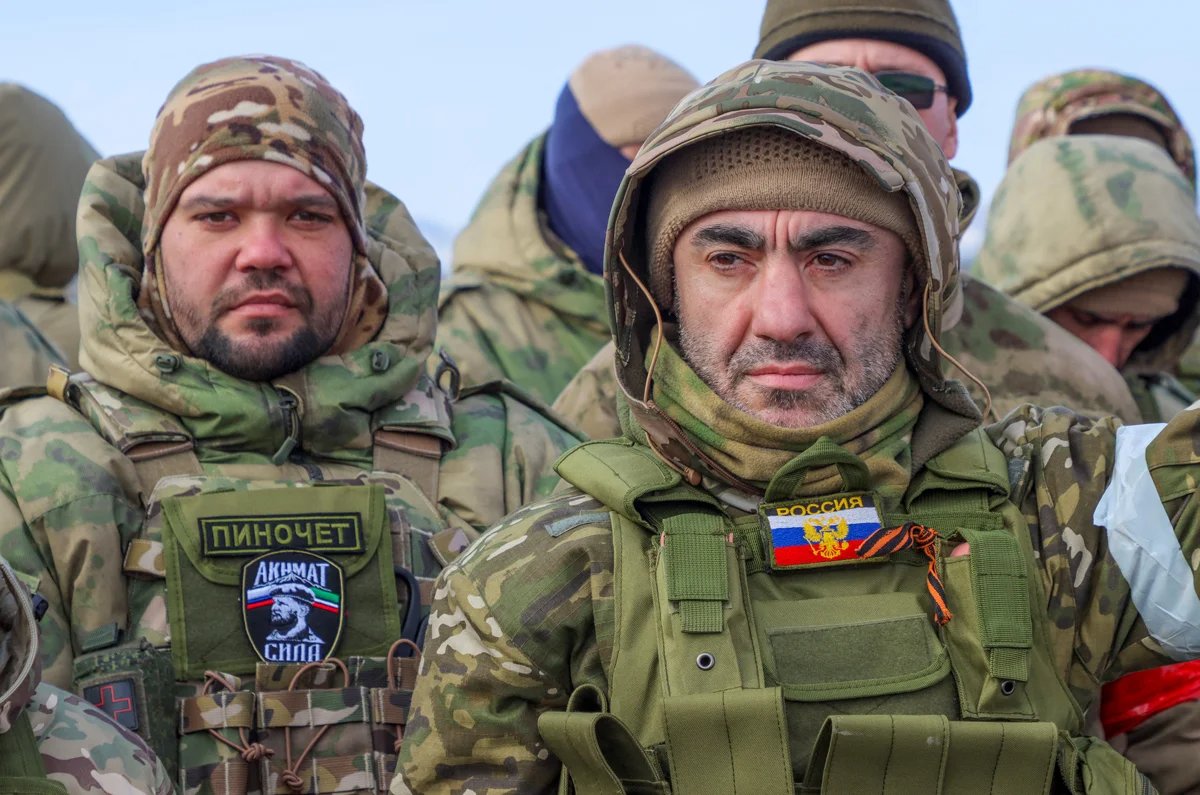
New recruits about to be sent to Akhmat Battalion positions at Grozny airport, 17 January 2024. Photo: Chingiz Kondarov
Indeed, most of what the generation of Chechens who grew up under Putin know about war they learned from playing computer games. Not only did they not take part in the Chechen resistance, very few of them have even served in the Russian army, due to a long-standing exception whereby members of ethnic groups indigenous to the North Caucasus are not required to complete the one-year military service that is mandatory for all other Russian males.
This fact makes Apti Alaudinov’s recent controversial comments, in which he rhetorically asked the parents of Russian conscripts what the point of their children was if they weren’t prepared to die for their country, laughable.
Alaudinov, besides being the commander of the Akhmat special forces, is also the deputy head of the military and political department of the Russian Defence Ministry. As such, he must be aware that the ministry will use Russian conscripts to take back the Kursk region.
What’s the point of children?
Despite officially restarting conscription on a tiny scale in 2014, the Russian military has not obliged the vast majority of Chechens to perform compulsory military service since 1991. At present, just 500 Chechens are called up in each wave of conscription, which amounts to just 0.33% of the total number of conscripts in the military’s most recent intake, a figure that has not changed even since the outbreak of war in Ukraine. As a result, only Chechens above the age of 52 have first hand experience of military service. In this sense, even conscripts who have served for just four months in the army are better trained fighters than those in the divisions Kadyrov has formed in Chechnya.
In February 2022 Kadyrov assembled several thousand so-called “Putin foot soldiers” in Grozny and promised to “take Kiev in three days”.
Why, since the start of the war, when the State Duma raised the maximum conscription age to 30, and conscription offices began hunting down men of service age throughout the country, has the Defence Ministry not increased the quota for conscripting soldiers from Chechnya? The explanation is simple: Kadyrov is against it and he has been granted a free hand to rule Chechnya as he sees fit in exchange for keeping the republic in line.
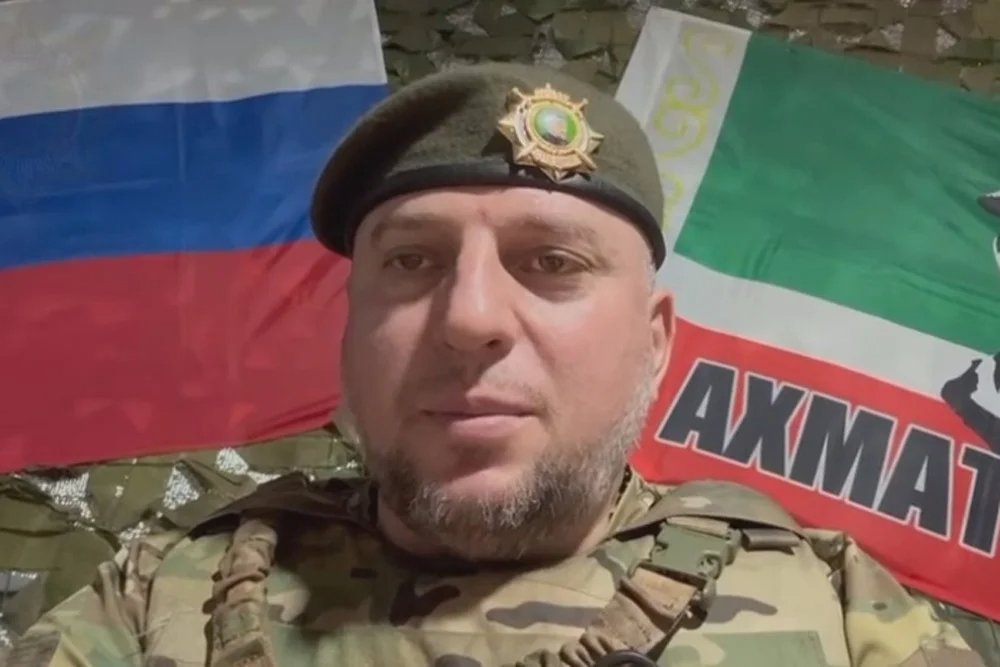
Apti Alaudinov Photo: Telegram
Firstly, increasing the quota for Chechen conscripts raises the issue about army service for the numerous sons of the Chechen elite. At present, not a single Chechen official, including Kadyrov, has a child serving in the Russian army. This does not stop these children from holding high-ranking government positions, of course.
In February 2022 Kadyrov assembled several thousand so-called “Putin foot soldiers” in Grozny and promised to “take Kiev in three days”. But when it became clear that it would not be possible, and that the Russian army had a severe shortage of soldiers, the thousands of “Putin foot soldiers” vanished into thin air.
New blood
But the main reason Kadyrov is fundamentally opposed to Chechnya joining Russia’s military power vertical (in particular by increasing the conscription quota) and to mobilisation in his republic is that he would lose one of his main power bases — his so-called “army”. If Chechens are conscripted into the Russian army, rather than assembled in full combat gear in a stadium in Grozny to scare the world, Kadyrov’s own image as “Putin’s foot soldier” will be under threat.
Sending ethnic Chechen units to Ukraine is also one of Kadyrov’s “tricks”, only on an even larger scale.
The figures that Kadyrov so proudly reported to Putin — 40,000 Chechen fighters and 19,000 volunteers — are far from reality, since soldiers sent to war in Chechnya are counted not by their heads, but by their contracts. Volunteers who are sent to the frontline through the Russian University of Special Forces sign a short-term contract for four months — and then sign another one again. When they sign a new contract, along with their salary (until recently 300,000 rubles (€3,040) a month), they receive a lump sum payment of the same amount. In fact, this is exactly what a volunteer named Ivan from the Rostov region told Putin during his recent visit to Chechnya, namely that this was his fifth military contract through the Vladimir Putin University of Special Forces in Gudermes.
The trick here is that Ivan from Rostov went to war as a volunteer from Chechnya five times, and so the reports from the Russian University of Special Forces state that not one, but five volunteers were sent to war. Because Ivan signed not one, but five contracts.
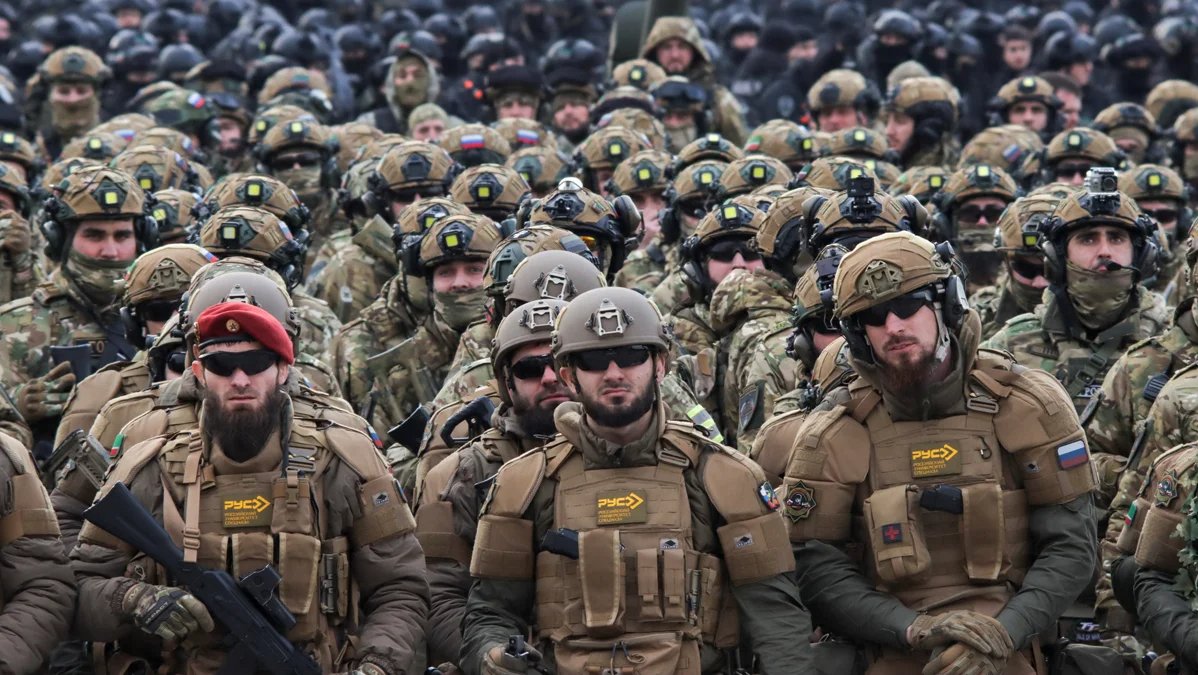
Photo: Chingiz Kondarov / Reuters / Scanpix / LETA
Sending ethnic Chechen units to Ukraine is also one of Kadyrov’s “tricks”, only on an even larger scale. Chechen soldiers are sent to the front on a rotational system. That is, every six months they replace each other. For example, 300 Chechens return from the war, another 300 Chechens replace them, and six months later they replace each other again. But on paper it looks as if Chechnya has sent 900 fighters to the war. In addition, until recently these units were deployed in the safest places: guarding the border regions.
Now the issue of reserves is a crucial problem for Russia as a whole, and it is already clear that conscripts are likely to be the main source. From this perspective, Alaudinov’s insane question about the point of children in Russia can logically be addressed to the Chechen leader and his cronies: what’s the point of Kadyrov’s children, if they are not prepared to die for their “great motherland”, as Vladimir Putin put it during his visit to Chechnya? And isn’t it time to raise the conscription quota in Chechnya and take the responsibility of forming armed units away from Ramzan Kadyrov, transferring it to the Ministry of Defence?
